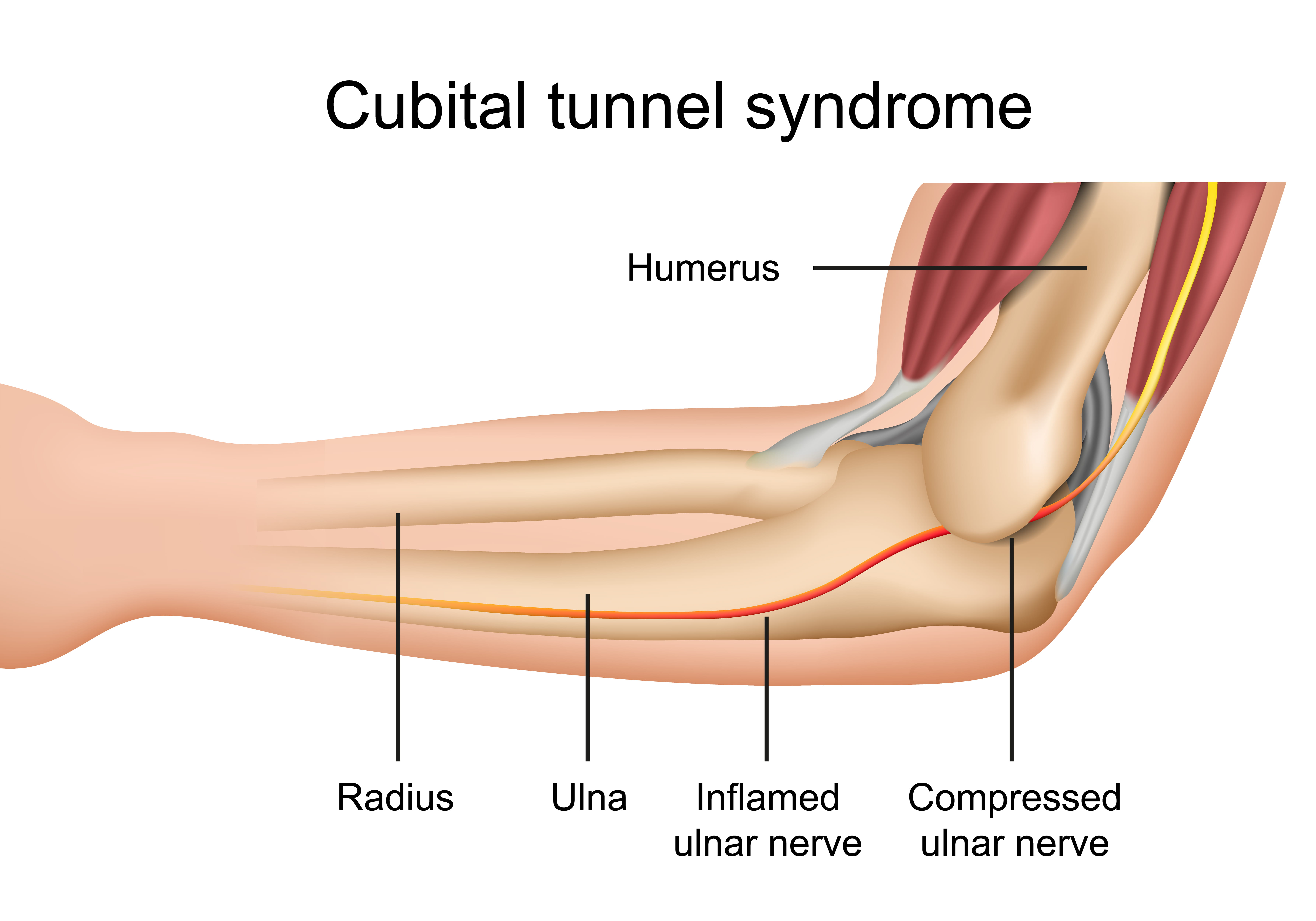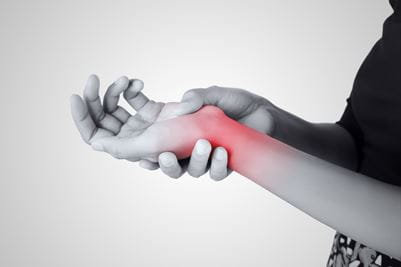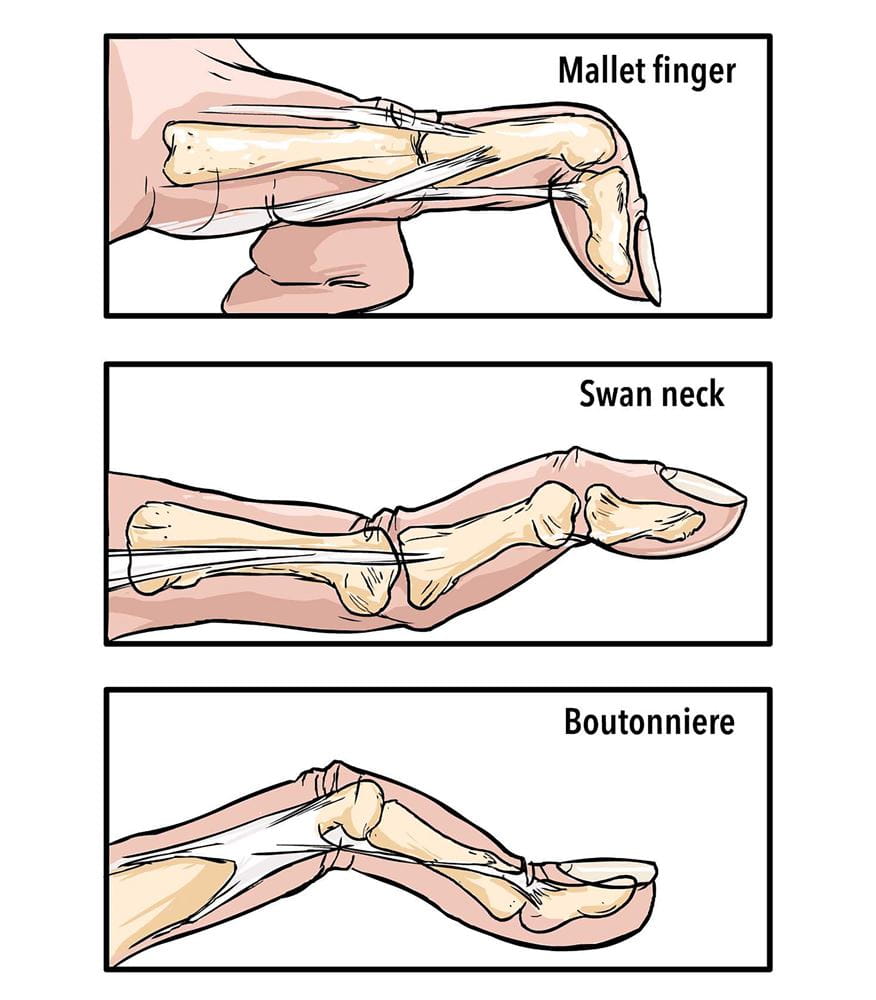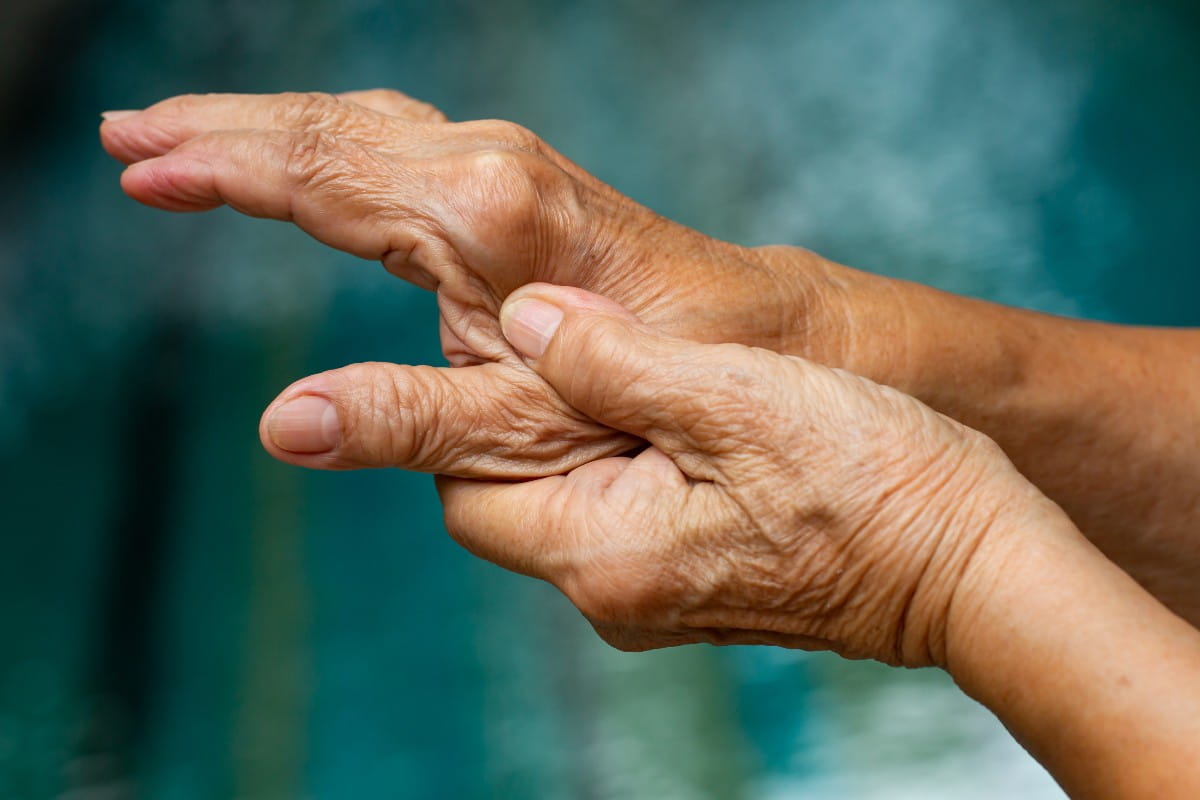Pain, numbness, stiffness or weakness in your hands or wrists can make even simple daily activities a challenge. Whether you're typing on a keyboard, picking up your child or returning a tennis serve, healthy hand and wrist function is essential to your quality of life.
At Riverside, our board-certified and fellowship-trained orthopedic specialists provide expert care for a wide range of hand and wrist conditions. These can range from wrist injuries and arthritis to nerve compression and overuse syndromes.
“You use your hands to interact with the world,” says James C. Kyriakedes, M.D., a Riverside orthopedic hand and wrist surgeon. “When pain or stiffness stops you from using your hands, it can disrupt your entire life. We seek to restore your lost hand function and help you get back to the activities you love or need to be able to do”
Top 10 Hand and Wrist Conditions We Treat
1. Carpal Tunnel Syndrome and Cubital Tunnel Syndrome
Carpal Tunnel:

Cubital Tunnel:

These common nerve compression syndromes affect the median nerve at the wrist (carpal tunnel) and the ulnar nerve at the elbow (cubital tunnel). They can cause:
- Numbness or tingling in the fingers
- Hand weakness or loss of grip strength
- Pain and uncomfortable hand symptoms that worsen during sleep or with repetitive hand use
These conditions may be caused by repetitive motions like typing or gripping and are often treated with splinting, steroid injections or surgery in more advanced cases.
2. Joint Damage from Osteoarthritis or Rheumatoid Arthritis

Hand arthritis is a leading cause of joint pain and joint stiffness. It occurs when cartilage in the joints wears away (osteoarthritis) or is attacked by the immune system (rheumatoid arthritis). Symptoms may include:
- Aching or throbbing pain
- Swelling in the fingers or wrist
- Decreased range of motion
Treatment may involve anti-inflammatory medications, joint injections, splints or surgical joint reconstruction.
3. Dupuytren’s Disease

A condition involving the palmar fascia, the layer of tissue just beneath the skin of the palm and fingers. Dupuytren’s causes it to thicken and tighten, forming cords under the skin. This can result in:
- Nodules in the palm with normal range of motion (most common)
- More advanced disease includes flexed fingers that cannot fully straighten (contractures), limiting hand movement
Dupuytren’s is more common in people of Northern European descent, and in men more than women. Dr. Kyriakedes’ practice includes the full spectrum of treatment for Dupuytren’s disease, including observation and reassurance in mild cases, to invasive treatment for finger contractures that limit hand function. Finger contracture correction can be completed in office using enzyme injections (i.e. collagenase) or minor outpatient surgery (needle aponeurotomy). For more advanced cases, removal of the diseased tissue is often a longer lasting correction (limited palmar fasciectomy).
4. Trigger Finger and Trigger Thumb

This condition occurs when inflammation thickens and narrows the passage of finger and thumb flexor tendons in the tendon sheath. Symptoms include:
- Pain or tenderness at the base of the affected finger or thumb
- A popping or catching sensation during movement
- Diget gets locked or temporarily stuck in a flexed (bent) position
Trigger finger is frequently seen in individuals with diabetes and those performing repetitive gripping actions. It is a very common condition, however, and the exact cause is often unclear. This condition is typically treatable, often through non-surgical treatments, with surgery available for persistent cases.
5. De Quervain’s Tenosynovitis

A leading cause of wrist pain near the thumb, this condition affects the tendons controlling thumb movement. It’s often due to repetitive motions like lifting children or using tools.
Symptoms include:
- Pain and swelling on the thumb side (radial side) of the wrist
- Difficulty moving the thumb, making a fist or lifting and manipulating objects or tools
Treatment may include rest, splinting, NSAIDs and corticosteroid injections, and is successful in approximately 80% of cases. Surgery is available for persistent cases.
6. Sports-Related Hand and Wrist Injuries

Hand and wrist injuries from sports are common and can be caused by falls, collisions, abrupt gripping forces during sports or repetitive stress. Common conditions include:
- Ligament sprains or tears
- Tendon strains or ruptures
- Tendonitis
- TFCC (triangular fibrocartilage complex) tears
- Finger fractures and dislocations
Overuse injuries are also especially common in athletes who rely on grip strength or high-impact activities. Many of these conditions resolve without surgical intervention, but certain acute injury patterns have the best long-term outcomes with surgery. Your hand surgeons will prioritize your long-term hand function and goals while focusing on the needs of your acute hand or wrist injury.
7. Hand, Wrist, and Forearm Fractures

A wrist fracture or broken hand bone can result from falls, sports injuries and motor vehicle accidents, name a few. Riverside’s orthopedic hand specialists have advanced training and years of sub-specialized experience in treating these injuries. Common injuries in their practices include:
- Distal radius fractures (including the common “Colles’ fracture” among other types)
- Scaphoid fracture (the most common carpal bone fracture). These fractures require careful treatment due to healing challenges and significant downstream problems if fracture healing is unsuccessful.
- Metacarpal and phalangeal fractures (hand and finger bones). These account for 20% of all fractures seen in the Emergency Departments and are frequently referred to Riverside’s hand specialists.
Signs of a fracture include swelling, bruising, deformity and inability to move the area.
8. Nerve and Tendon Injuries

Lacerations, blunt trauma or overuse can damage the delicate nerves and tendons running from the elbow to the fingertips. These injuries may result in:
- Loss of sensation or movement
- Difficulty gripping or pinching
- Sharp pain or weakness
Early treatment helps prevent permanent dysfunction. Surgical treatment of nerve and tendon injuries requires subspecialized training to optimize patient outcomes.
9. Hand and Wrist Tumors or Cysts

Most hand and wrist tumors, such as ganglion cysts, are benign. However, they can still interfere with daily activities, cause discomfort or their appearance can be concerning to patients. Signs include:
- Visible lumps under the skin
- Aching or pressure in the affected area
- Restricted movement
Treatment may involve observation and reassurance, aspiration or outpatient surgical excision of the mass.
10. Finger Deformities

Conditions like swan neck deformity or boutonnière deformity may stem from arthritis, trauma or tendon imbalances. These deformities may:
- Affect the way fingers bend or straighten
- Cause stiffness, pain or weakness
- Limit fine motor skills
Specialized therapy, specific finger rings or splints, or surgery reconstruction can restore function and appearance.
When to See a Hand Specialist
Don’t ignore persistent hand or wrist pain, even if it seems mild at first. If you experience:
- Loss of a specific function, like bending the last joint of the finger
- Blunt trauma leading to bruising of the hand or wrist
- Sharp pain lasting more than a few days
- Atraumatic swelling and stiffness that does not improve with rest, gentle range of motion and moist heat
- Clicking, locking or deformity that interferes with functionality and quality of life
- Loss of grip strength or sensation
…it’s time to consult a time to consult a hand surgery specialist. Early diagnosis often leads to better patient outcomes, with more treatment options to consider. In some cases, earlier treatment is necessary to prevent chronic damage or loss of hand function. In other cases, earlier diagnosis provides reassurance that observation or nonoperative treatment is safe to continue.
Expert Care at Riverside Orthopedic and Sports Medicine Specialists
At Riverside, we offer advanced imaging, certified hand therapy, non-operative treatment options and minimally invasive surgical treatments for all types of hand and wrist conditions. Whether you’re recovering from an injury or managing a chronic disorder, we’re here to help you return to the activities you love.
Schedule an appointment online for your hand or wrist evaluation or call 757-534-9988 to schedule an appointment with an orthopedic specialists.



